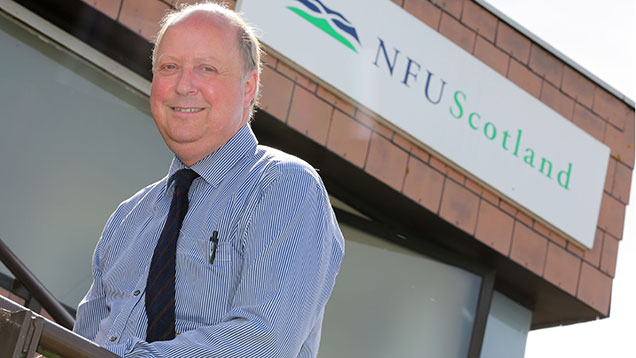NFUS president calls for action on CAP funds, GMs and tenancy reform
 © Rex Features
© Rex Features The outgoing NFU Scotland president has warned there is a huge unfinished agenda on convergence funding, farmgate prices, tenancy legislation and GM crops facing Scottish agriculture.
Nigel Miller, who steps down as NFUS president on 10 February, said farming had a bright future in Scotland.
But he told the union’s council meeting in St Andrews that his successor had to keep up the momentum on tenancy reform proposals and had to tackle the block on GM crop development.
See also: NFU Scotland election: Runners and riders
Mr Miller, who has been NFUS president for four years, said the next stage of Scottish tenancy reform needed to be moved quickly to the legislative phase and suggested the original review group should be reconstituted to ensure the spirit of the proposed package was not lost. And he called for a standalone legislative slot for agricultural holdings legislation before the next election.
“There is considerable support within the union to move quickly on the recent recommendations from the Agricultural Holdings Legislation Review Group (AHLRG) but also a level of caution. Lessons learned from 2003 changes demonstrate how important it is to get the legislative detail right if we are to create stability,” Mr Miller said.
“Specialist working groups should be established to develop the AHLRG and to bolt down the text into robust legislation.
“This process is all about creating a more balanced and collaborative tenanted sector with new opportunities. That vision must be carried forward to the legislative phase,” he added.
Mr Miller also highlighted the row over convergence funding between Westminster and Holyrood.
So-called convergence funding is allocated to member states that have a lower-than-average farm payment a hectare.
The UK received €223m (£177m) from Brussels but only qualifies because Scotland’s lower-than-average payment brings the national average down.
The Scottish government has argued that all of that money should go north of the border.
“Defra has had three ministers who have said they’ll look at convergence,” Mr Miller said.
“We accept a deal can’t be done at this stage but we need a time-frame agreed. It needs to happen before the UK election in May because UK ministers have repeatedly made a commitment and other parties also need to be challenged on their approach.”
In his wide-ranging speech Mr Miller quoted figures on the growers’ share of retail prices to emphasise the importance of new research and technology to make farms more efficient.
“In the 2006 crisis, potatoes were retailing at £1.80/kg of which the producers’ share was 17p. Today, potatoes are selling in supermarkets for £1.99/kg of which the producers’ share is 7p. Potatoes retail at almost £2,000/t and producers are getting £70/t at the farmgate,” Mr Miller said.
“In crops, our yields have plateaued. We need to break the block on any discussion on using our scientific capability to work our way out of that plateau. At the James Hutton Institute, we have world-leading expertise in potatoes and soft fruit but it has the potential to be Europe’s centre for barley,” he told the meeting.
And he warned that the block on crop development was undermining the scientific community and called for politicians to “get behind the headlines of GM and find a way forward”.
“Having a science and ethics body oversee plant breeding could allow precision techniques to accelerate what could be achieved through conventional breeding alone. If that body was to be established in Scotland, then the intellectual property could stay with the research body rather than corporate hands,” Mr Miller said.
